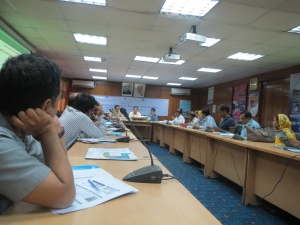Newsroom :: News :: Ecosystem Based Management and shared governance as solutions to address climate change impact on coastal fishery
Ecosystem Based Management and shared governance as solutions to address climate change impact on coastal fishery
Experts and practitioners urge for nature based solutions to address the challenges being faced in coastal fishery due to reduced water flow coupled with climatic changes
Location: Dhaka, Bangladesh. 6th Jul 2014
One of the many ecosystems services of the coastal rivers is fishery. It provides a large share of fisheries capture in the country. These rivers also supply brackish water, fish fry, shrimp post larvae, Crablets and enormous nutrients in support of the aqua culture. Global and local changes in climate and human practice potentially can change the nature and quality of services provided by these rivers which eventually impacts the coastal community.
The seminar was presided by the Director General of the Department of Fisheries MR Syed Arif Azad, IUCN Country Representative Mr Ishtiaq Uddin Ahmad was the Chief Guest while Ecosystems for Life Dialogue Advisor and Former Secretary of the Government of Bangladesh, Mr Mihir Kanti Majumdar spoke at the occasion as special guest. Two articles based on scientific facts were presented by Dr Niamul Naser of Dhaka University and Dr Nazmul Ahsan of Khulna University.
In his remarks, the Director General Mr Azad acknowledged the role of common platform and partnership to take forward initiatives for ecosystems based approach in fisheries management. In addition to that, he committed to scale up a few learning from the seminar in specific, which includes, removal of the cross dam identified by Dr Naser within three working days, scaling up an MFF small grant project for livelihoods shift of the shrimp post larvae collectors to aquaculture, and adoption of the techniques innovated by Khulna university in future for safer shrimp culture.
“Co-management of coastal natural resources including mangroves, canals and wetlands is needed to ensure sustenance of the ecosystems and ecosystem services as well as ensuring rights of coastal community”, said IUCN Country representative.
“It is the richness of our ecosystems and their services that sustained 160 million population until now and without conservation and proper management, we will have to invest a huge amount to get the services which we now get free of cost.” said, Mr Majumdar. He urged all concerns to adopt integrated management to ensure healthy ecosystems in the country.
In the seminar, Dr Naser presented how different human interventions coupled with climatic changes are impacting fishery and associated phenomenon in the the Goari- Modhumoti-Boleshwar river system. His paper highlighted the illegal cross-dams for fishing and human interventions as a potential threat to the river’s ecosystems. Dr Naser also spoke about the less water flow in the rivers that might cause increased temperature in the dry season leading to rapid depletion of fish population. He urged the policy makers for a basin-wide approach to address the issues impacting river biodiversity.
Dr Ahsan shared outcomes of a range of researches by Khulna University on different points of rivers in side and around the Sundarban. About 54 species of fishes and 93 species of phytoplankton were identified in the research and potential changes in the fishery productivity in case of increased temperature, salinity ingress and sea level rise were also explored. As a solution to the current challenges in coastal fishery, solutions like integrated agri-aquaculture, conservation of mangroves as fishery nurseries and strong biosafety regulation at farm level was recommended. He also pointed out that our coastal fishery especially shrimp culture is being continued under inconsistent policy shift and loss of ecosystem connectivity which requires attention and reform.
Dr Anwara Begum Shelly, MFF National Coordinator and Mr Dipankar Aich, Dialogue Coordinator, IUCN introduced Mangroves for the Future (MFF) and Ecosystems for Life to the participants of the seminar.

Seminar on Fisheries, Climate Change Resilience and Nature B ... , Dhaka, Bangladesh © IUCN, 2014